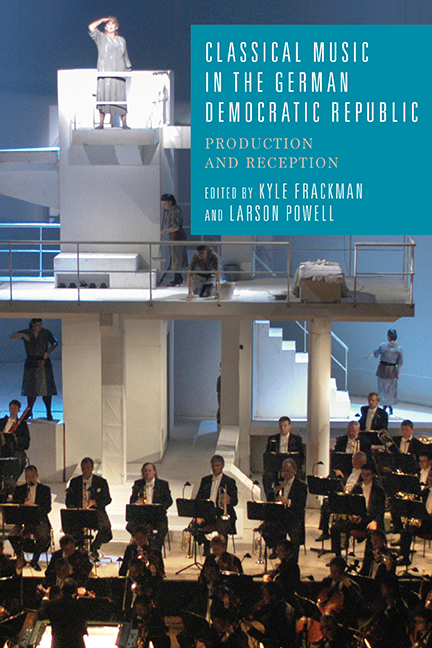Book contents
- Frontmatter
- Contents
- Acknowledgments
- List of Abbreviations
- Introduction: Music and Heritage in the German Democratic Republic
- 1 Provincialism, Modernity, and the Classical Heritage: The Administrative Structure of the GDR and the Situation of Music Production
- 2 Classicism as Anti-Fascist Heritage: Realism and Myth in Ernst Hermann Meyer’s Mansfelder Oratorium (1950)
- 3 Positioning Georg Knepler in the Musicological Discourse of the GDR
- 4 Ehrt euren Deutschen Meister: Reproducing Wagner in the GDR
- 5 The Embodiment of Collective Memory in Neue Odyssee
- 6 Marxism and Feminism in Ruth Berghaus’s Staging of Don Giovanni
- 7 Beyond the Gewandhaus: Mahler and the GDR
- 8 Hanns Eisler’s Funeral and Cultures of Commemoration in the GDR
- 9 Exile—Remigration—Socialist Realism: The Role of Classical Music in the Works of Paul Dessau
- 10 “What a Satisfying Task for a Composer!”: Paul Dessau’s Music for The German Story (. . .Du und mancher Kamerad)
- 11 Friedrich Schenker and the Third Way
- 12 A Prism of East German Music: Lothar Voigtländer
- Notes on the Contributors
- Index
3 - Positioning Georg Knepler in the Musicological Discourse of the GDR
Published online by Cambridge University Press: 21 May 2021
- Frontmatter
- Contents
- Acknowledgments
- List of Abbreviations
- Introduction: Music and Heritage in the German Democratic Republic
- 1 Provincialism, Modernity, and the Classical Heritage: The Administrative Structure of the GDR and the Situation of Music Production
- 2 Classicism as Anti-Fascist Heritage: Realism and Myth in Ernst Hermann Meyer’s Mansfelder Oratorium (1950)
- 3 Positioning Georg Knepler in the Musicological Discourse of the GDR
- 4 Ehrt euren Deutschen Meister: Reproducing Wagner in the GDR
- 5 The Embodiment of Collective Memory in Neue Odyssee
- 6 Marxism and Feminism in Ruth Berghaus’s Staging of Don Giovanni
- 7 Beyond the Gewandhaus: Mahler and the GDR
- 8 Hanns Eisler’s Funeral and Cultures of Commemoration in the GDR
- 9 Exile—Remigration—Socialist Realism: The Role of Classical Music in the Works of Paul Dessau
- 10 “What a Satisfying Task for a Composer!”: Paul Dessau’s Music for The German Story (. . .Du und mancher Kamerad)
- 11 Friedrich Schenker and the Third Way
- 12 A Prism of East German Music: Lothar Voigtländer
- Notes on the Contributors
- Index
Summary
You know how tricky it is these days to portray the life of an old Communist without producing either apologetics or a whitewash.
—Georg KneplerTHIS ESSAY SEEKS TO SITUATE Knepler within the musicological discourse of the GDR primarily by assessing his relationship with the regime and the position he took in relevant controversies but also, though to a lesser degree, by reading what his vita as a scholar and author tells us about his attempts to place himself within this context. In terms of the former, I pay special attention to the year 1964, which seems to have been of particular importance for Knepler's reorientation. In terms of the latter, I suggest that Knepler's decision to abort his multivolume history of nineteenth-century music and focus instead on History as a Means of Understanding Music (Geschichte als Weg zum Musikverständnis, 1977; 2nd rev. ed. 1982), while in many ways a perfectly logical extension of concerns that had preoccupied him for many years if not decades, also signified a radical repositioning in terms of his modus operandi.
Knepler as Zhdanovite
In the abstract of her article on “Dahlhaus, Knepler, and Ideologies of Music History” (2003), as far as I can see the only sustained discussion of Georg Knepler (1906–2003, born in Vienna) in Anglophone literature, Anne Shreffler stated that Georg Knepler's work is “comparable to Dahlhaus's in importance” and that “his ideas anticipate many tenets of the ‘new musicology.’” On a similar note, in his short article on Knepler (also 2003) in Musik in Geschichte und Gegenwart, Peter Gülke refers to Knepler as “the most important representative of a self-avowed Marxist musicology,” adding that “his personal impact and that of his works as well as the resistance he encountered tell us as much about the recent history of the discipline as they do about him.” No other musicologist had pursued interdisciplinary communication and cooperation as extensively as Knepler and he was in fact “an—albeit unknown—founding father of the New Musicology.”
Yet clearly such attempts to boost Knepler's status have hardly borne fruit and there can be little doubt that Knepler is cited more often than he is seriously engaged, and he is not all that often cited, at that.
- Type
- Chapter
- Information
- Classical Music in the German Democratic RepublicProduction and Reception, pp. 58 - 74Publisher: Boydell & BrewerPrint publication year: 2015

